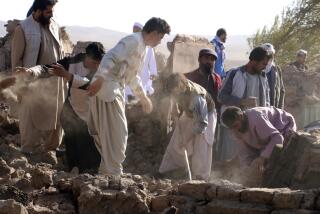Show Afghanistan the Money, German Leader Urges World Donors
- Share via
KABUL, Afghanistan — KABUL, Afghanistan -- After touring the rubble of this once-resplendent city on the fabled Silk Road, German Chancellor Gerhard Schroeder on Thursday urged the international community to speed up $4.5 billion in reconstruction aid so that Afghans see the fruits of peace before holding a congress to choose new leaders.
Noting that some donors have taken a wait-and-see approach ahead of next month’s loya jirga, a conference of tribal elders that will select the next government here, Schroeder said such hesitation could disillusion Afghans about the outside world’s commitment.
“I have heard that financial institutions very much want to wait” until after the gathering to release significant amounts of the aid pledged at a January conference in Tokyo, Schroeder said. “It would be better if at least the beginning of the changes in the country were visible by the time the loya jirga convenes.”
The German leader also said his nation, which has contributed more than 1,000 troops to a peacekeeping force here, was unlikely to add more soldiers to the effort, despite a plea from his Afghan hosts.
Germany has played a leading role in the global effort to bring peace and security to Afghanistan after more than two decades of bloodshed. Schroeder’s government was host to United Nations-brokered talks near Bonn late last year that led to the appointment of an interim Afghan government led by Prime Minister Hamid Karzai.
Berlin is also bankrolling the loya jirga, which convenes June 10. About 1,500 delegates from throughout Afghanistan will choose a provisional head of state and parliament. Those institutions will run the country until national elections can be organized about 18 months later.
Wary of the continuing power of some regional warlords and their occasional efforts to undermine Karzai, donor countries have been slow in sending money, except for the most urgent food and medical needs.
Karzai, who met reporters together with Schroeder, cited the programs for disarming factional forces, which are now stalled, as an example of a further step toward stability that could be taken with the arrival of more money.
“The chancellor is very right in saying it is better for the international community and international institutions to bring help to Afghanistan right now and not wait for the loya jirga process,” Karzai said.
Germany has promised more than $280million in aid over the next three years.
Karzai, who is enjoying widespread popularity and respect among fellow Afghans as the chaos of the past fades, apparently made a pitch to Schroeder for broader German participation in the International Security Assistance Force, or ISAF, which keeps the peace in Kabul, the capital.
Karzai has urged deployment of the peacekeepers in other sensitive areas of Afghanistan to strengthen what remains a tenuous stability, especially in northern and southeastern regions where warlords are still fighting one another.
But Schroeder made clear that his government feels it has gone as far as it can by providing about one-fourth of the 4,500-member peacekeeping force.
“With the presence we have mustered here in Kabul, we feel we have reached the limit of our capabilities, and therefore we do not see ourselves in a position to expand our area of operations beyond Kabul,” Schroeder said. He reiterated, however, that countries contributing to the 18-nation force agree that the mandate should be extended beyond its June expiration.
Asked how long Afghans will need foreign forces to protect them, Karzai said that depended on how quickly an Afghan national army could be readied. The first 600 members of a planned force of 100,000 have received their initial training from international peacekeepers, but Karzai predicted that it would take years to provide effective defense and security forces.
Karzai had been lobbying Germany to take up command of ISAF after the British complete their term at the helm next month. But Schroeder turned down the Afghan leader during a March visit to Berlin, and Turkey is now preparing, with U.S. economic assistance, to take over the peacekeeping force.
Meanwhile, at Bagram air base, where Afghan missions in the U.S.-led coalition fight against global terrorism are being directed, a senior British officer said Royal Marines scouring a mountainous region of Paktika province had discovered four caves filled with ammunition believed to belong to Al Qaeda and Taliban fighters.
The search-and-destroy mission in eastern Afghanistan, called Operation Snipe, seeks to roll up any support for the Islamic militants who have engaged coalition forces in fierce battles in Tora Bora in December and in the Shahi Kot valley in March. The Royal Marines reportedly did not encounter enemy forces, but Brig. Roger Lane said the operation has been successful in showing that “we can deny them access to a safe haven for subsequent terrorist operations.”
Some of the caves discovered by the 1,000-strong force involved in Operation Snipe had been sealed with padlocked metal doors. Troops will be exploring the caves once explosives experts check the obstructions for booby traps, Lane told reporters at Bagram.
More to Read
Sign up for Essential California
The most important California stories and recommendations in your inbox every morning.
You may occasionally receive promotional content from the Los Angeles Times.














